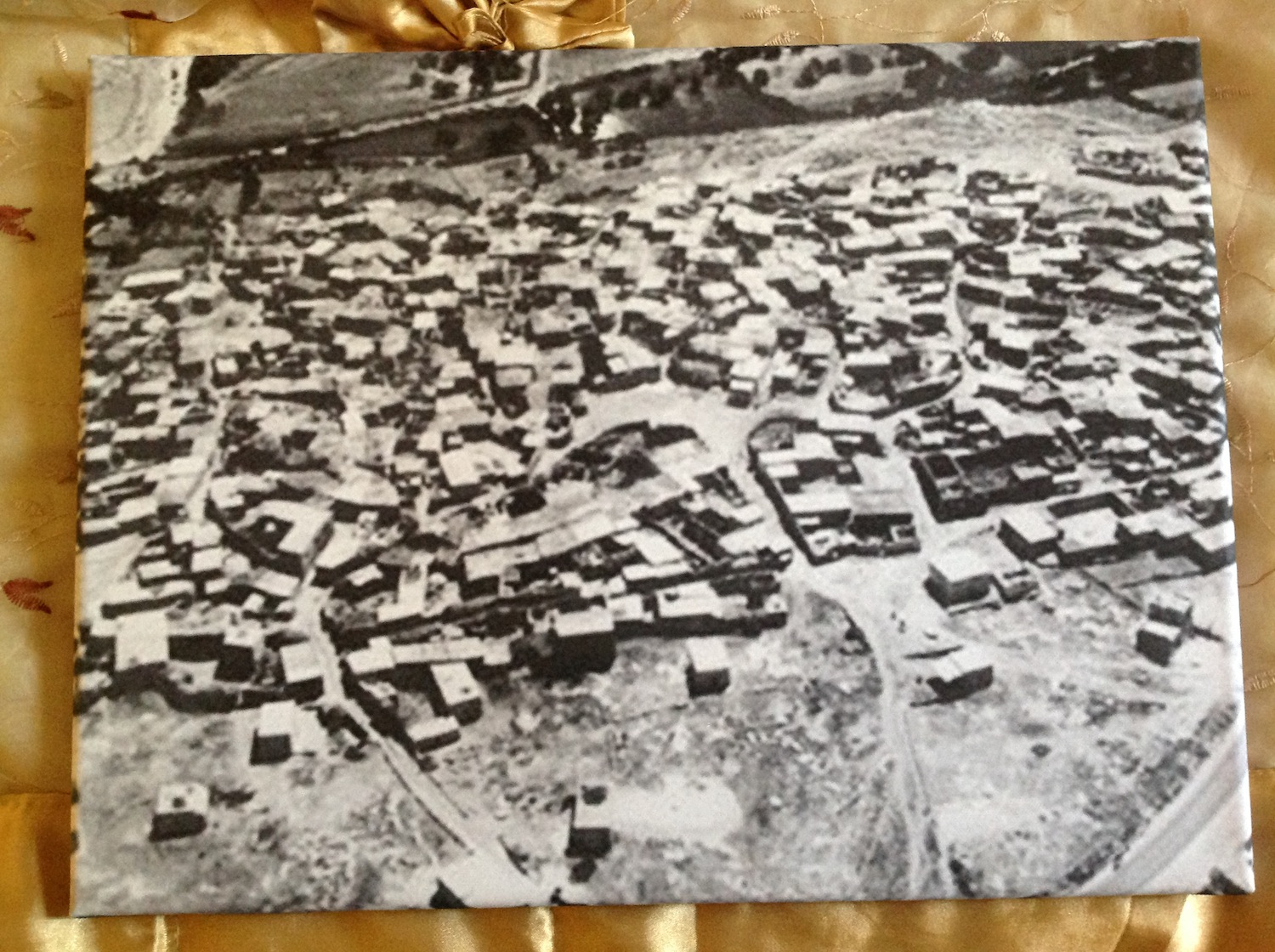"I come from there and I have memories
Born as mortals are, I have a mother
And a house with many windows, I have brothers, friends, And a prison cell with a cold window.
Mine is the wave, snatched by sea-gulls, I have my own view, And an extra blade of grass.
Mine is the moon at the far edge of the words, And the bounty of birds, And the immortal olive tree.
I walked this land before the swords
Turned its living body into a laden table.
I come from there. I render the sky unto her mother
When the sky weeps for her mother.
And I weep to make myself known
To a returning cloud.
I learnt all the words worthy of the court of blood
So that I could break the rule.
I learnt all the words and broke them up
To make a single word: Homeland.....
Mahmoud Darwish
_________________________________________________________________
When we were young we’d sit with my grandmother as she told us about the land, our ancestors, the houses in the village, its families.
A necklace rested on her bosom: a black string on which she’d tied the key to our house in al-Qubab village.
She remembered the village as if it had been the palm of her hand - its people, houses, groves, children and adults, the sky, the stream, its olive and almond trees and everything that happened there and in the neighboring villages.
We heard grandmother tell us of her ordeal, the torments she’d undergone, the nakba of her people, the historic injustice done to our village and to Palestine. Her words strengthened us, gave us hope, reaffirmed our belief in our right to return. Those were the moments of my childhood I most enjoyed, my most beautiful memories.
Grandmother planted love for the village in our souls, promised we’d return someday.
She kept saying: we’re going back tomorrow.
More than sixty years passed but grandmother continues to insist we’re going back tomorrow.
My grandmother died years ago. We still have the key. The house awaits our return.
We grew up, and our dream grew within us.
_______________________________________
We made an appointment to meet Eitan, a member of Zochrot, on Saturday 13, July 2013 at 10:00.
We were very glad to meet him. He’s a person who’s calm, very affable, easy to connect with. We feel as if we’ve known him a long time. We met at the Latrun gas station. We tried to imagine beforehand what Eitan looked like. My son Yunis recognized him, pointed him out. After introductions we followed him toward al-Qubab.
We’re very near the village. My father’s description of the road to the village was correct in every detail – the sharp turns at the building off to the right which had once been a school and is now a special forces base.
The village slowly came into view and my pulse quickened. We drove on. We turned right through a forest leading to what had been the village center.
A roundabout leads to Kfar Bin Nun, where Khirbi and Ayn Yarda are located. The next right past the roundabout leads to Lehi Forest. The air I’m now breathing now tastes different. We drive closer to the remaining buildings, some abandoned, some on the verge of collapse, some renovated.
The time has come – we’ve been yearning for so long and the historic moment has arrived. We’re finally at the entrance to al-Qubab.We’re very emotional – our feelings are mixed, like the ruined walls of some of the buildings standing near the restored walls of others.
I tried to control myself – even momentarily – to hide my storm of emotions. I saw that Eitan had noticed how I felt. It was important to me to experience these moments immediately, hear my grandmother’s voice, see her as if in a fast-forwarded film. It’s a magnificent sight, greater than the lens of the camera documenting it. The silence is astonishing.
On one of the side streets we ran into a man about 60 years old and a woman with her boy.
We depend on Eitan to communicate with the residents because he speaks the language. We stood off to one side waiting for him to invite us to join the conversation.
We understood the man had been three months old when he came to the village. We spoke with them briefly; they were very nice. We told them who we were, why we’d come; they name al-Qubab was new to them.
We walked on, stopped next to a house near the main road. Eitan approached the metal gate, spoke with a young man, then with a woman whose arm was in a cast. We waited a few yards away to see the outcome of the negotiation.
We waited only a few minutes, but my heart sank. I expected them to refuse to admit us. Eitan employed all his skills to convince them and ease their minds. You could see it clearly on everyone’s faces. Eventually they allowed us to bring the cars around the house through a metal gate that could be opened remotely.
A building in the courtyard appeared on the verge of collapse. I photograph. Yakoub, our nine year old son, says, “Don’t let anyone tear it down. When I grow up I’ll come back, rebuild it and turn it into an art gallery.” “Yes, Yakoub,” says Eitan, “don’t forget your right to return.”
We thanked our hosts and continued. Another house of the village was nearby on the main road. It’s attractive, renovated, with a wide entryway and a metal gate, trees and flowers decorating the garden.
Luckily the door was open. Eitan went forward and called out. A man in his sixties emerged, wearing a hat, carrying an alcoholic drink in his hand. He greeted Eitan, offered him a drink. It seemed to me the offer took Eitan by surprise. We waited by the gate, watching tensely, surprised at how smoothly and quickly the discussion went.
They called to us. We came forward, greeted the man, he greeted us and offered us a drink. I thanked him apologetically for refusing. His wife came to greet us as well. I think she was from Czechoslovakia. They invited us in, asked the children whether they wanted something cold to drink. Cold soda is always welcome. The house was stunning, in wonderful taste, like an art gallery, with glass doors. Appetizing food was laid out as if they were waiting for guests. We apologized for showing up without warning. We conversed a bit, telling them where we were from and why we’d come.
Eitan and Yossi talked to each other; I asked and received permission to take photographs. The children were very happy, playing and enjoying themselves. There was a pool; the children were invited to swim. We thanked them, apologized that we didn’t want to intrude, nor did we having bathing suits for the children.
I was hurrying to take as many photographs as possible. Olive trees, pomegranate, Mulberry and others. It looked like a bit of paradise. I heard my grandmother’s voice describing the village houses, its groves, olive, pomegranate and almond trees, the prickly pear cactuses, the village streets.We heard a car outside. A couple and two children emerged from it. A real family atmosphere developed, the children’s enjoyment affecting everyone.
I told them who we were, about my parents who’d left al-Qubab on May 15, 1948, that my father had lost a son and daughter during the Nakba. I think the story affected them. It came time to go, we said goodbye and hoped we’d meet again.
Yossi surprised us, asked us to follow his car. He took us to the forest and showed us the border spot according to the 1947 Partition Plan. We continued through the forest to Wadi Ayalon, filled with almond trees and prickly pear cactus. We drove until we reached the main road from Latrun to al-Qubab.
We returned to the village, passed the school, turned right opposite Yossi’s house to what had been Muhammad Yasin’s house. The house is well-known in the village, a lovely building that now houses the locality’s offices. We stopped and took some photos. According to what my father told us, our house was about 50 meters away from this one. We saw a kindergarten there now. My father said there was a huge tree under which they sat. The tree is still there but the house was demolished. We saw children from the kindergarten playing there.
We walked into the village and saw a spectacularly beautiful building. Again Eitan’s job is to knock on the door and ask permission to come in. He talked with the residents, a man about 30 and a woman.
We noticed that the conversation seemed fairly serious, and after further discussion with the man Eitan looked happier. We waited outside, as usual, for a sign from him. He called us; it turned out the man had been taken aback somewhat by the surprise visit but soon relaxed and changed his tone.
He asked us to give him a few minute to finish the cleaning we’d interrupted when we suddenly appeared. When he’d done he welcomed us and allowed us in to take photographs. We were in for a big surprise – they were living there in a short-term rental.
It seemed to me that our surprise visits to the houses made their residents uncomfortable, confused them, perhaps even made them apprehensive about possible consequences.
We talked a bit, I told them the name of the village, of my father’s suffering, of the expulsion of the villagers, the deaths of my uncle, my aunt and my grandfather during the expulsion. The man responded very emotionally and even apologized for what happened to my family. His reaction surprised me; I told him he had no reason to apologize.
They suggested we see the area behind the house where there are old buildings that show clearly the social differences in the locality. He probably meant socio-economic differences. We thanked them for their gracious welcome, took a few more photos around and in front of the house, of some piles of stones indicating that there had been old buildings there.
We went with Eitan to a few more buildings. One was an abandoned structure on the main road; Eitan said it had been a cheese factory.
After more than three hours together, it was time to part. It was hot, and meeting Eitan warmed us even more. It wasn’t easy to leave and say goodbye; words were inadequate to express our feelings. Eitan’s presence during our first visit to Al-Qubab village had a huge effect on us and made it much easier. I say this very seriously: Eitan made our dream a reality. We wouldn’t have been able to visit the homes and take photographs without him.We are very fond of Eitan, and have great respect for his wonderful work.
We parted with beautiful memories and a desire to meet again soon. We made a friend during our journey; it was a great day for us that will remain engraved forever in our souls.
The children continue to mention him.
After leaving Eitan we drove around the village a little longer, through the streets, the turns – the car can go everywhere.
Tomorrow is Sunday. We’re going to Jordan.
Sunday, 14.7.2013 Today we’ll visit the village to say goodbye.
There’s nothing we can do – it’s time to part…
Again the yearning, while parting burns…
We walked the village streets, its outskirts, the forest…
How hard it is.
The forest is perfectly silent, so different from when my children’s voices and their movements instilled new life in the village. The painful, bitter truth is that we’re facing the ruins of homes and piles of stones scattered in every direction.
Each prickly pear cactus indicates a house, each row of them defined boundaries between homes and plots of land.
Here, in al-Qubab, was a living community, here was the fire they kindled, their guest houses, the courtyards where they danced, their meeting places, their locations, their flour mills, schools, shops, neighborhoods, their cemeteries.Here they were, and their scent remains. A peaceful community, wonderfully welcoming, pleased to live modestly, dreaming of a secure future.
Now it’s dispersed, tasting the bitterness of exile.
The trees still stand, untiring,
Awaiting the return of their people,
The olive trees still stand sturdily, witnesses to the tragedy of al-Qubub’s people.
We took handfuls of earth from beneath the olive trees to revive our spirits in exile and to connect us to the homeland. The children left stones they had brought from Norway. The olive trees were the only ones they could depend on to watch over them.
We sent regards to the village on behalf of all the residents whose time to return had not yet arrived,
We sent the yearnings of those who left, of those born in exile
We will not say farewell to al-Qubab.
We will see you soon, with our family and friends.
Many wait to return. The photographs and the earth we have taken may ignite the flames of longing and make people begin planning to return to al-Qubab.
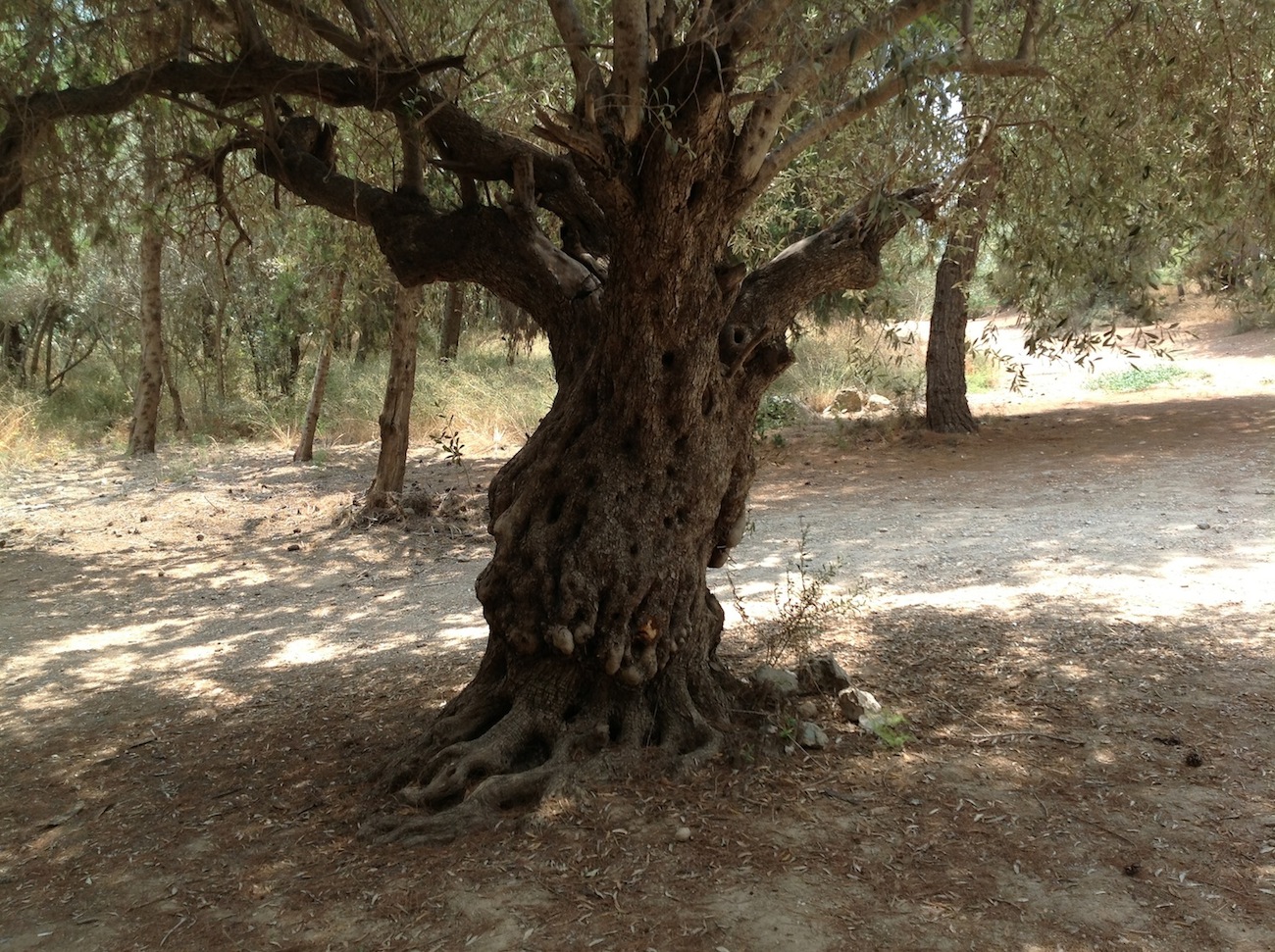
עץ זית באלקבאב / Olive tree at al-Qubab
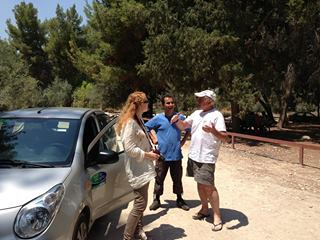
ביקור שורשים בקובאב / Roots visit at Qubab
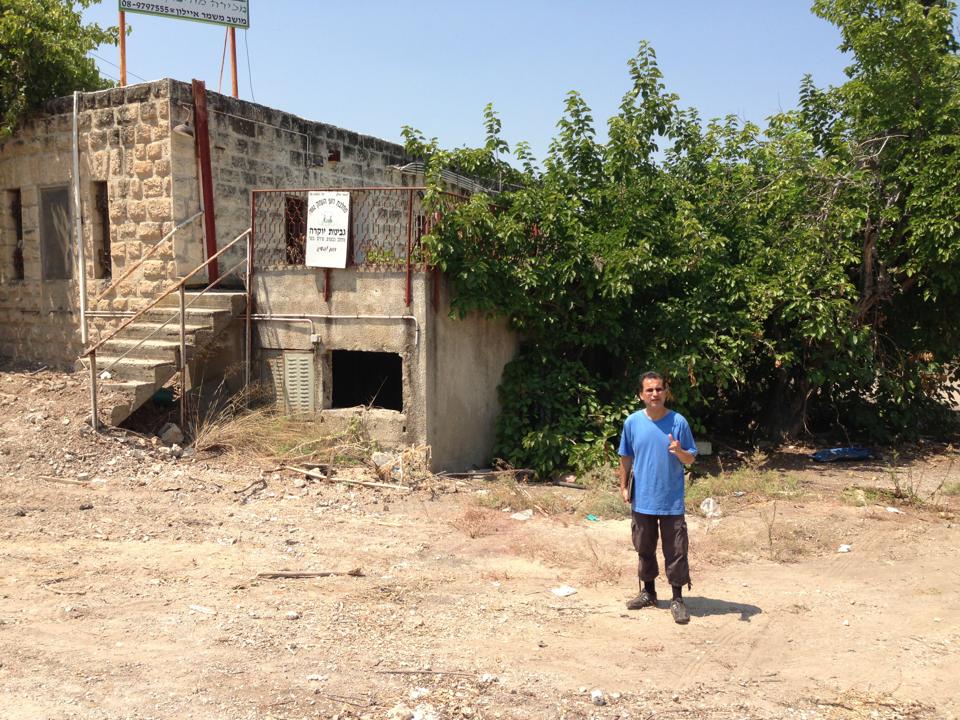
אני מכאן / I'm from here
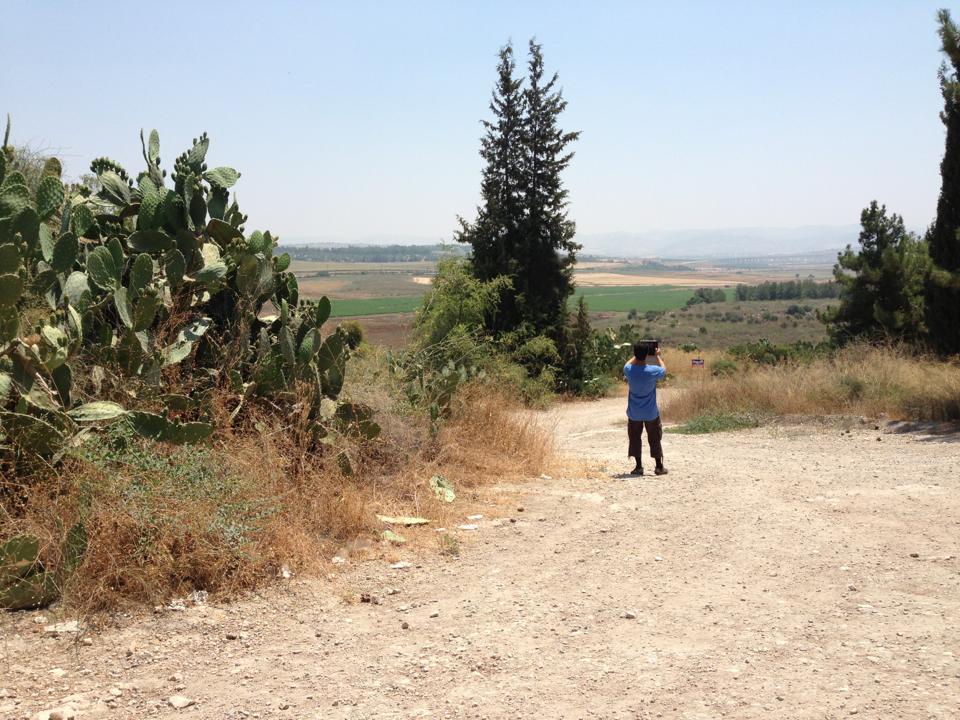
ביקור שורשים בקובאב / Roots visit at Qubab
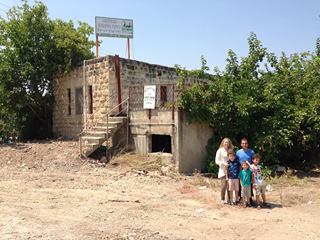
יוסף, הגה ושלושת ילדיהם בקבאב / Jesf, Hege and their three kids at al-Qubab
---------------
Translation to English: Charles Kamen.


